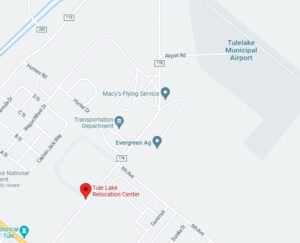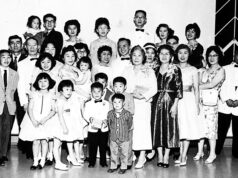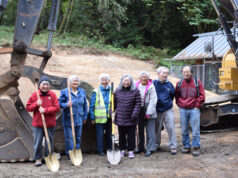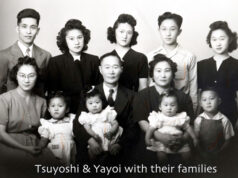By Barbara Takei
For The North American Post

Image Google Maps
The U.S. Ninth Circuit Court of Appeals in San Francisco is poised to decide if Japanese Americans have a right to assert claims over the purchase and sale of the Tulelake airfield — a small rural airfield sited in the middle of the WWII Tule Lake JA concentration camp. Tule Lake is the camp — of 10 such camps — that became a maximum security segregation Center to punish those who protested their incarceration under false pretenses.
This April 18, a three-judge panel will decide Tule Lake Committee’s challenge to the September 2020 decision of Judge William B. Shubb, Eastern District of California, who dismissed TLC v. Federal Aviation Administration (FAA) et al. He ruled that the court lacked “federal jurisdiction” to consider the claim of JAs. This left no rationale for survivors and descendants of those incarcerated at Tule Lake to have a voice concerning the historic site where 27,000 of our family members were incarcerated and 331 died.
The land under legal dispute is a 359-acre portion of the Tule Lake Camp barracks area. When the camp closed in March 1946, the site was treated as worthless surplus property and given to the nearby city of Tulelake for use as an airfield. Like many places which have spiritual and emotional significance to people of color, this rare, historically significant site was paved over and erased.
Since 2000, JAs have worked to preserve the unique Tule Lake civil rights site. However, in 2014, Modoc County, the airfield’s sponsor, prepared to implement a $3.5 million dollar Tulelake airfield expansion plan. It took two lawsuits to force compliance with environmental laws which protect the historically significant Tulelake airfield. The airfield’s owner, the city of Tulelake, then decided it no longer wanted responsibility for the site. Rather than negotiating a return to the Department of Interior, the city disposed of it, selling the camp lands to the Oklahoma Modoc Nation for the sum of $17,500 — approximately $50 an acre. In its bid to purchase the airfield, the Oklahoma-based tribe promised to align with local farmers and ranchers to overturn Native American water rights, and to expand aviation on the Tulelake airfield site. In addition, it promised the city of Tulelake free legal representation in the conflict over the airfield. Despite Modoc County’s half-century role as the airfield’s sponsor, the County’s offer to match the Tribe’s was ignored. The Tule Lake Committee also offered more than double the price paid by the Modoc Nation. It too was ignored.
To heal from the pain and trauma of the government’s racist forced removal and incarceration, JAs make pilgrimages and seek to preserve the Tule Lake concentration camp as a place of remembrance. We had hoped the Oklahoma Tribe and city of Tulelake would feel compassion for our desire to protect and have access to a place of great spiritual and historic significance. Instead, they dismissed JA emotional connections to this place of grief, pain and loss as “hypothetical” and “imagined.”
Even though their brief (Aug. 31, 2022) acknowledges the former barracks area as “one of the most emotionally significant areas on the Airport property,” the Tribe and the city of Tulelake argued, “an airport is not a recreational or sightseeing site.” Their rationale for preventing site access to JA survivors and descendants is that access “has always been restricted” and that the Tribe should derive “enjoyment and exercise of the property rights it received.”
It is difficult to comprehend why the Oklahoma Modoc Nation considers Tule Lake’s concentration camp land — a place of tragedy and human suffering — as an appropriate place to operate an aviation business. We trust that the three-judge Ninth Circuit panel will recognize that denying JAs a voice in the disposition of the Tule Lake site is not a path toward reparative justice and healing.

Barbara Takei has been a Tule Lake activist for two decades.






